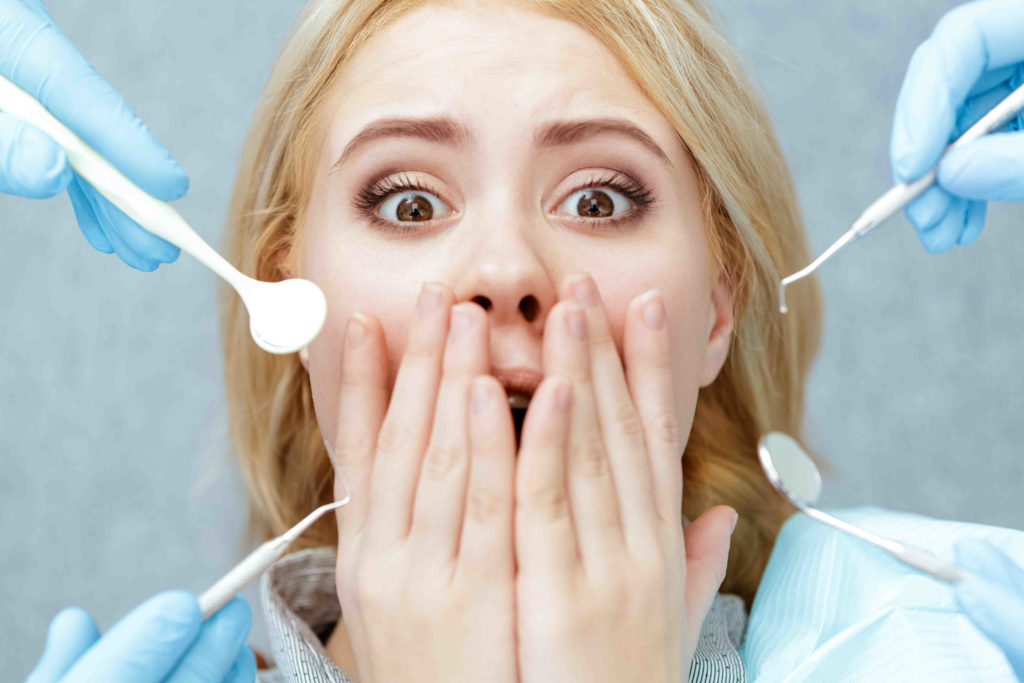Think only children are afraid of the dentist? Well, many adults in Switzerland are affected by dentophobia. This phenomenon can take many forms. Some patients experience simple apprehension, others anxiety or even a real phobia at the thought of consulting a dentist in Lausanne or Fribourg, for example. In the most extreme cases, this fear leads to the neglect of oral care and the onset of serious problems.
Dentophobia has several levels
Stomatophobia, dentophobia or odontophobia are the various names for what is more commonly known as fear of the dentist.
Of course, it's rare to visit a dental practice out of the blue. In the collective imagination, treatment by a dentist is fundamentally associated with pain. As a result, most patients are naturally apprehensive about undergoing them.
Fear is when someone shows symptoms of anxiety before consulting a dentist in Lausanne or Fribourg. This can manifest itself, for example, as insomnia the night before an appointment for dental treatment. This fear is one of the main reasons why Swiss people avoid going to the dentist.
When this apprehension intensifies and expresses itself physically, it's called dental phobia. Symptoms of dentophobia include hyperventilation, tremors, tachycardia, excessive sweating and nausea. In its most severe forms, dentophobia can lead to panic attacks or unconsciousness.
The repercussions of dentophobia should not be underestimated, especially as it affects more people than you might think. It can lead some people to refuse even the most basic dental treatment. This represents a real health problem in the case ofdental emergency . Ultimately, this phobia jeopardizes oral hygiene, and even the patient's general state of health.
Why are we afraid of the dentist?
In our subconscious, we retain the image of the tooth puller. We therefore tend to associate dental care at a painful moment. Although techniques have undergone great innovation, the fear of pain remains very real. It is the main reason why children and adults in Switzerland are afraid of the dentist.
To explain it, some patients mention the noise of dental appliances that make their teeth grind. Others seem put off by the smell of hygiene products in dental practices from Fribourg to Lausanne, via Aigle. Some fear the anaesthetic procedure in particular, or the bleeding.
Surveys also reveal another reason for refusing dental treatment: the shame of showing dirty or damaged teeth to a specialist. In addition, some patients justify their dentophobia by perceiving dental treatment as intrusive.
In most cases, people who are afraid to consult a dentist have had a traumatic experience in their past. Painful tooth extraction, dental accident, hospitalization or even assault can all trigger symptoms of intense fear.
In the long term, these people can forget about their oral hygiene. Plaque builds up, and the repercussions are not long in coming: periodontal diseasesGingivitis, cavities, tooth loss, even ENT problems and heart disease. Psychologically, bad teeth prevent people from smiling, eating and expressing themselves properly. The social and emotional lives of dental phobics are irreparably affected.
Solutions for dentophobia
Nevertheless, the news is reassuring. You can tame your phobia of the dentist and overcome any psychological block you may have. The first thing to do is confess your anxiety or fear to your doctor. Your doctor needs to be informed of the situation, so that he or she can understand your reactions and reassure you. Establishing a relationship of trust with your dentist is essential if you are to feel at ease.
If you suffer from mild anxiety, specialists advise you to go to bed early the night before your consultation, and to avoid taking any stimulants (caffeine, theine, etc.). You can also practice relaxation or meditation methods in the waiting room at the dental surgery. Listen to music, practice breathing exercises and try to visualize pleasant images.
Are you experiencing symptoms of intense dentophobia? Your dentist in Lausanne or Fribourg may be able to prescribe anti-anxiety medication. Conscious sedation with MEOPA (equimolar mixture of oxygen and nitrous oxide), more commonly known as "laughing gas", is also a solution. For the past ten years, dentists have been allowed to use it in dental practices. Finally, anaesthesia is considered when oral abandonment requires heavy interventions in the oral cavity.
Other gentle and alternative methods exist to treat dentophobia over the long term:
- hypnosis
- teaching through video
- psychotherapy
The HELVIDENT dental centers in Lausanne, Fribourg and Aigle is at your service to offer you the full range of dental care in the best possible conditions.

